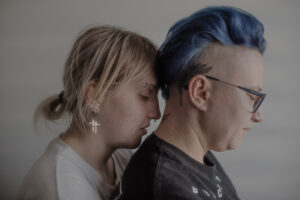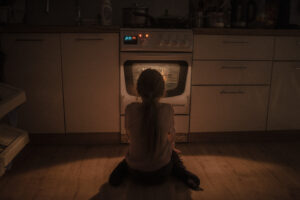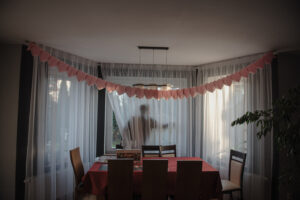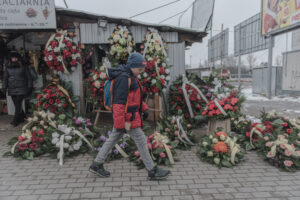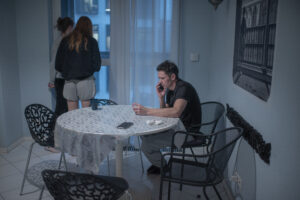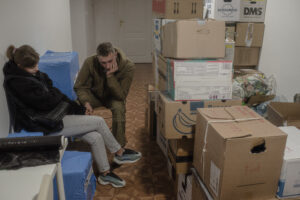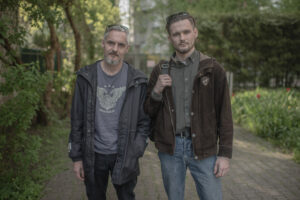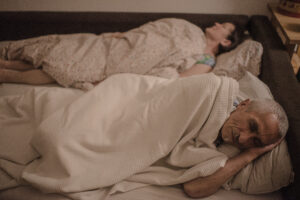
“I had a return ticket, but I realised I would not be going back.” Award-winning photographer Pasha Kritchko on his battle for the future of Belarus
Pasha Kritchko was interviewed by Zerkalo.io a few weeks before he was announced as the Belarusian winner of the EU-funded photo contest on Family Connections. The interview uncovered Pasha’s path from engineer to documentarist, via wedding photography and volunteering, as well as his opinions on the place of the photographer in the military and political crisis in Eastern Europe, and the laws that since 2020 have governed the lives of Belarusians, including the protagonists of his works and himself. This story was compiled based on Pasha’s answers.
From builder to wedding photographer
In general, I am a builder [smiles]. I was an engineer by training, completed my master’s degree and worked in my profession. Photography was my student hobby – I shot for myself with a digital camera and medium-format film.
It became a new job almost by accident: I willed myself to help shoot a few weddings… it wasn’t about the money, but comparing it to a sedentary office job. I decided that I wanted to try and change things, so I took a risk: I left the construction profession to go nowhere. That is, to shoot weddings.
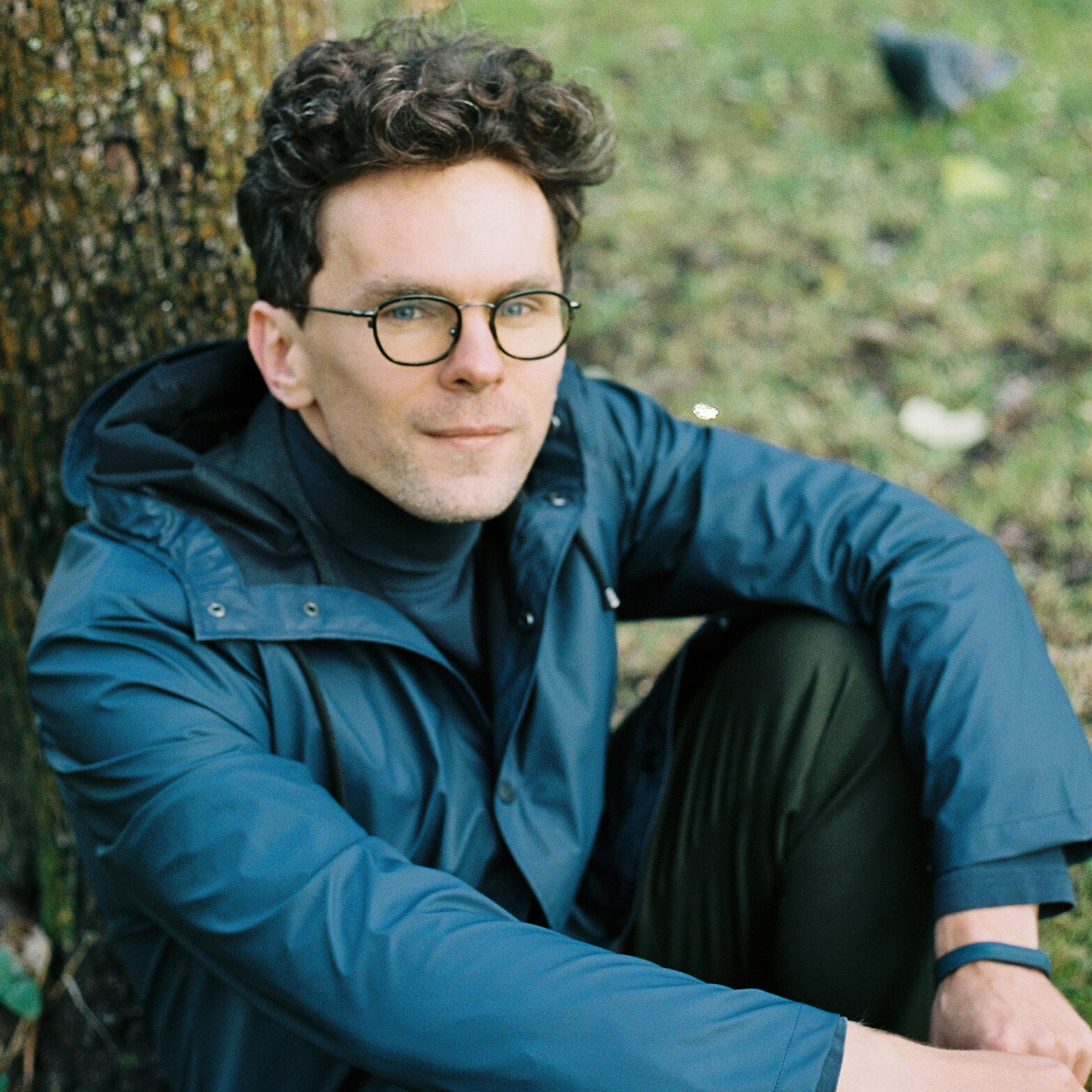
It was the end of 2013, and already in 2014 I somehow became the best wedding photographer in Belarus [at a competition of the same name from the community of videographers]. I wasn’t even really working yet. That’s how it went in the following years: I mostly shot weddings, and occasionally even crossed paths with freelance construction again.
And then… Then, like everyone else: 2020 happened.
From wedding photographer to volunteer
I didn’t do documentary photography until 2020, and I can’t say that it became my work that year. It was the usual desire to help the common cause, to record what was happening in Belarus from the start of the election campaign. That’s why I signed up as a volunteer at Viktar Babaryka’s headquarters and filmed everything that happened to him during trips and meetings.
After Babaryvka was arrested, I photographed the joint headquarters [of three candidates: Viktar Babaryka, Sviatlana Tikhanouskaya and Valer Tsapkala]. During this period, I took a photo that became very famous. However, I cannot say that it was more important than any of my other photos from that year. All are important, it is a record of our history. This one just went viral.
And after another round of arrests and the departure from Belarus of some of the representatives of the joint headquarters, I just kept on shooting.

Protests, courts… Usually I was lucky and managed to avoid being detained. This eventually happened to me twice: on October 11, 2020 [when security forces detained several dozen journalists and photographers] and on July 6, 2021 when Babaryka’s sentence was announced. I did not spend a day in jail – I got off with a confiscation of equipment during my first detention and had to sign a paper on the “consequences of extremism” during the last one [people detained at protests were sometimes asked to sign documents stating that they were aware of their potential liability for further participation in mass rallies].
This kind of life lasted about a year. Then, in August 2021, I had the opportunity for a short trip to Poland, a chance to breathe and reboot, look at everything from the outside, talk to European photographers. I got my permission and I left quietly. While I was there, Kalesnikova was sentenced, and another wave of the “migration crisis” began [at the Belarus-EU border], then news came about the shootout between IT worker Andrei Zeltser and KGB servicemen, and then about the detention of the journalist Henadz Mazheika, who wrote about it…
In 2022, Pasha Kritchko won a mobility grant from the European Union-funded EU4Culture project for the Eastern Partnership countries. As part of it, he attended the largest international festival of photojournalism Visa pour L'Image in Perpignan, France, where he had the opportunity to meet famous photographers and present his portfolio to editors of the world's leading media, including The New York Times and The Globe and Mail.
I had a return ticket, but I realised that I would not be going back. I thought: If I did, what would I do? Stay silent, put my camera away, sit quietly and just wait for them to come after me anyway? I took my own answer calmly – knowing that reflection at this point could be detrimental: I was sure that I could be useful here as well.
From volunteer to documentary photographer
After coming to Poland, my work focused on two big themes.
The first is home, the very notion and feeling that people who have left Belarus put into that word. The question was very interesting and important for me personally. Immediately after moving to Poland, I lived for a while on a kitchen couch in the flat of a Pole who sheltered me, then a little later slept on an air mattress in the flat of a Belarusian who had emigrated a long time ago [after the 2010 protests], then there was one of the Belarusian shelters… And I wanted to explore how others feel, understanding the transience of what is their home right now.
After 2020 and the events in Belarus, many Belarusians became like one big family, although some were forced to leave the country. That’s why I want to show through my photos, how people are connected, how they are starting a new life, but also how they have lost their former connections.
This theme is not widely represented in the news, and not many people are aware of what is happening in Belarus. Most people know more about, say, Russia. So in my photos I wanted to show an example, using the stories of ordinary people that reflect the whole society and what is happening to us now.
I think I am in the same situation as all Belarusians who have left the country and cannot return. That’s why I started this project, started filming families who are struggling outside the country.
The second theme has a start date of 24 February 2022. The war mixed a lot of things up: I started filming Belarusians from Ukraine, Ukrainians in Poland, Belarusian volunteers in Ukraine…
Some of the latter went to fight for Ukraine straight from Belarus. Everyone there had a generally settled life, a job – they left everything and went. Someone told me: “This is my war, too. I believe that I will help Ukraine win, and in the future I will liberate Belarus as well.” Quite often I heard this: “I’m there alone. I’m sitting and stupidly waiting for someone to come for me. In Ukraine, with weapons in my hands, I feel safer than in Belarus, because I understand who my enemy is and where he is right now.” Such things are said by hundreds of people! And this means that there were and still are enough people in Belarus who are able to do something. Some of them were trying to be active – they just didn’t know about each other, they felt unable to be really useful and to fulfil themselves. They have managed to convince us that we are alone. This is the old talk of learned helplessness.
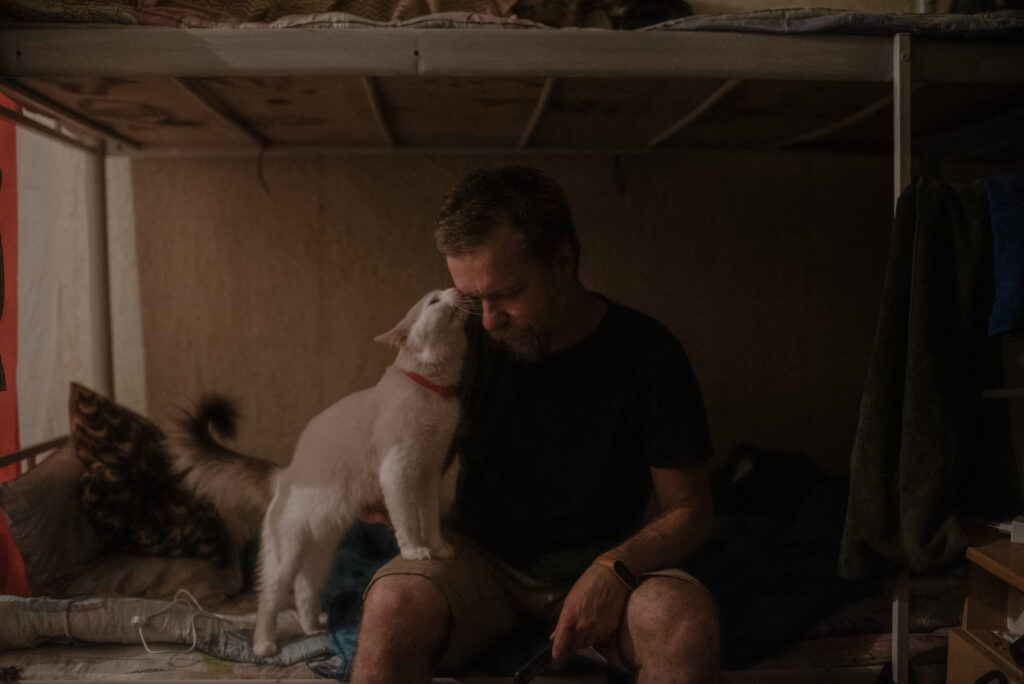
Confusion and misunderstanding of how much people can still do together is also typical among those who have left – even those who have been away for a long time. They are often completely absorbed in everyday life: getting settled in a new place, sending a child to school, doing all the documents, learning a language, finding a job… I sometimes observe how people who have just moved from Belarus come up and ask from the bottom of their hearts: “How can I help? Where should I go right now to help someone?” And after a while, the questions change: “Where to live? How to earn a living?” There is an opinion that this is a conscious pause: “Help yourself first so that you can effectively help others later.” I want to believe that this is true.
To see how it changes people, you have to watch them all the time. I regularly shoot one Belarusian family and see how it is: “here” a child has already been born, “there” a relative has died, they cannot return – criminal cases… When you shoot politicians, you see completely different problems and difficulties. But at the same time, everything is connected: it is as if you are looking at very different layers of the same story.
And as time goes on, it becomes more and more difficult to observe: many people ask not to have their faces photographed, not to mention them in any way. The explanation is increasingly: “We have relatives and friends there. We are afraid that they will come to them because of us.”
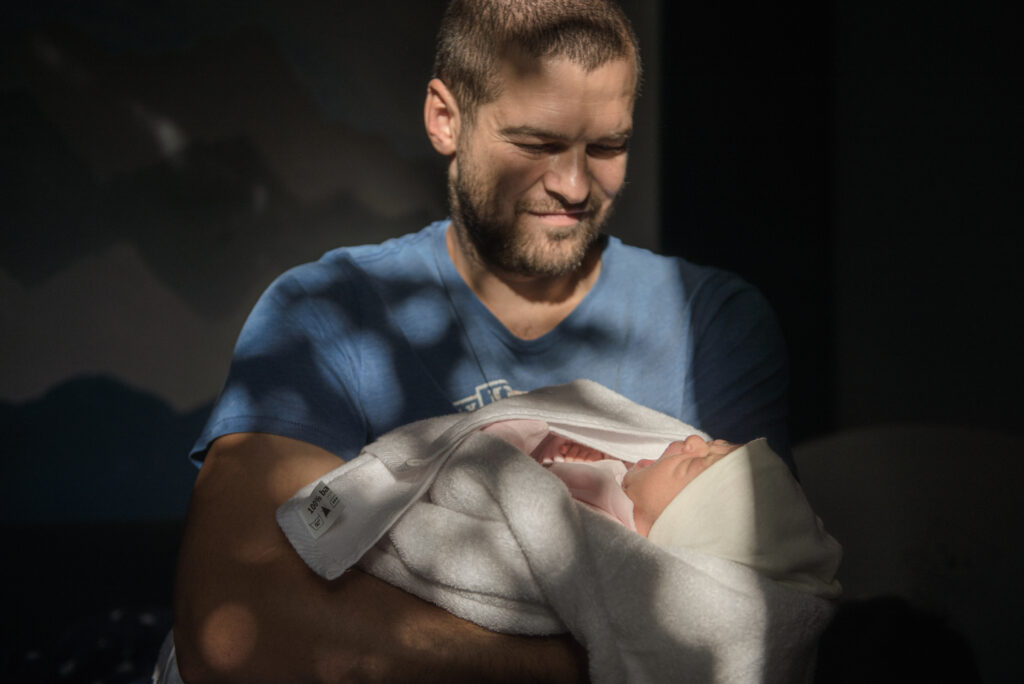
Do you know what is very memorable? 7 August 2022, a rally in Warsaw on the second anniversary of the elections.
I had just returned to Poland from Ukraine at the time: I was filming Belarusian volunteers and spent a whole week there just for myself; I saw the mood of people whose warring country had been bombed every day for six months in a row: ‘We are strong. We can all do it. We will do everything. We will make it.”
I returned to Poland and had an opportunity to compare this with the mood of the Belarusian emigrants – active, who came out in action. And at that moment, I felt that Belarusians were just tired. And I was tired, too. Everyone knows that one must not give up, that one must find strength and inspiration, otherwise everything may be in vain. Perhaps, the Belarusians are at this very stage now: tiredness which must be overcome.
And I realised that I have had the same theme all this time – the Belarusian crisis. Starting from the summer of 2020 and the brutality of the Belarusian security forces, through the war and the mingling of diasporas in 2022, and right now, in the spring of 2023.
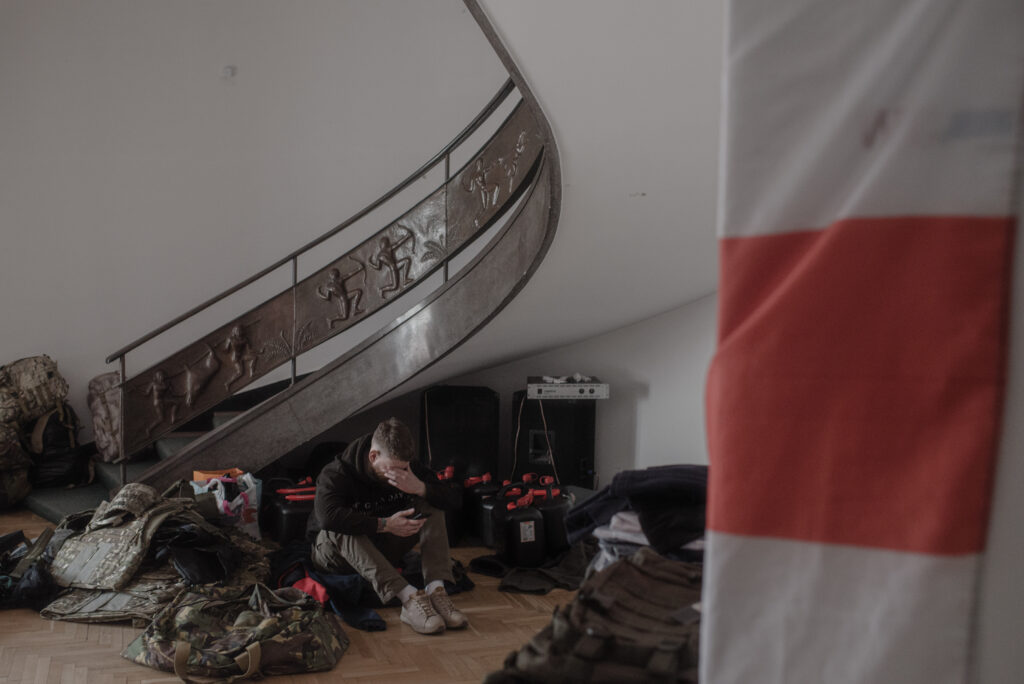
Why am I continuing? Because I know how important it is for the future of Belarus. So that everyone in the future would know and remember what people went through, what personal price they paid and are paying. Now the main purpose of my work is to do everything so that the whole world would continue to know and think about what is happening to Belarusians, so that what has happened and what is happening is not forgotten by Belarusians themselves. This is a useful story for any democratic country, in which one day there are many people who are “out of politics”: it is a reminder of what such attitudes can lead to over the years.
So that some of the things that happen in my works don’t happen again. And that some – solidarity, support for each other, awareness of one’s strength – should be repeated as soon as possible. Belarusians are not victims, we remain strong: and despite everything, we have not given up yet.
The “Family Connections” photo contest was organised by EU NEIGHBOURS east together with Fotofestiwal and funded by the EU. More than 400 professional photographers from Armenia, Azerbaijan, Belarus, Georgia, Moldova and Ukraine took part in it this year: three contenders from each country were shortlisted, and six winners were announced on March 31. The competition sought sets of photographs around the theme of ‘family connections’, with artistic, social and above all personal interpretations.
Article published in Russian by Zerkalo.io
Distribution channels: Politics
Legal Disclaimer:
EIN Presswire provides this news content "as is" without warranty of any kind. We do not accept any responsibility or liability for the accuracy, content, images, videos, licenses, completeness, legality, or reliability of the information contained in this article. If you have any complaints or copyright issues related to this article, kindly contact the author above.
Submit your press release
